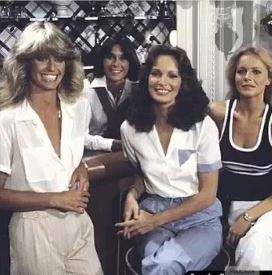
When Charlie’s Angels premiered in 1976, it did more than entertain — it transformed television. Farrah Fawcett, Kate Jackson, and Jaclyn Smith weren’t just playing detectives; they were redefining what it meant to be women on screen. Intelligent, fearless, and effortlessly stylish, the Angels broke stereotypes by combining strength, wit, and grace. Audiences had never seen women leading an action series with such charisma, and for millions of viewers, they became symbols of empowerment — proving that confidence and femininity could exist side by side.
Behind the scenes, the production carried its own set of stories. John Forsythe, the voice of the elusive Charlie, famously recorded his first lines in his pajamas after replacing the original actor. Budget shortcuts led editors to reuse exterior car shots in every episode — even parking the Angels’ cars illegally in red zones. Salaries also reflected Hollywood’s early gender pay gap: Farrah Fawcett and Jaclyn Smith earned $5,000 per episode, while Kate Jackson made twice as much. By the final season, Jaclyn Smith’s earnings soared to $75,000 per episode, making her one of television’s highest-paid women.
Success didn’t come without turbulence. Farrah Fawcett, whose image became synonymous with the show, left after the first season over creative differences and a desire for deeper, more serious film roles. Her exit sparked headlines, lawsuits, and change — both for her career and for women seeking more control in Hollywood. Cheryl Ladd replaced her, debuting humorously in a T-shirt reading “Farrah Fawcett Minor,” acknowledging the shadow she stepped into. Despite lineup changes and shifting ratings, Charlie’s Angels never lost its spark.

When the show ended in 1981, its legacy was undeniable. It inspired generations of women to see strength and independence as beautiful, setting the stage for modern female heroes. Reboots in 2000 and 2019 — featuring stars like Cameron Diaz, Drew Barrymore, Lucy Liu, and Kristen Stewart — carried its message forward: women could lead, protect, and shine on their own terms. For all its glamor and camp, Charlie’s Angels did something extraordinary — it made courage iconic and forever changed how television portrayed women.